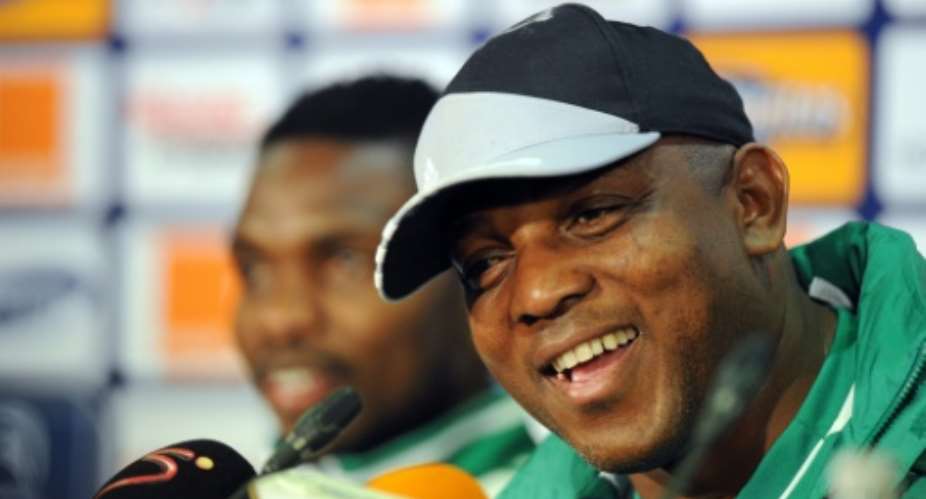Abuja (AFP) - Nigeria's President Muhammadu Buhari on Wednesday led tributes to former Super Eagles player and coach Stephen Keshi, who died of a suspected heart attack at the age of 54.
"Nigeria today lost a great sportsman, football player, coach and citizen," Buhari wrote on his official Twitter account, adding: "Nigerian football will not be the same without Stephen Keshi.
"He gave his country his all. May his soul rest in peace."
Keshi was one of African football's most recognisable figures, who was one of only two men with Egypt's Mahmoud El-Gohary to lift the Africa Cup of Nations as both a player and coach.
As a coach, he was the first African to get two countries to the World Cup finals -- Togo in 2006 and Nigeria in 2014 -- and the first manager from the continent to reach the last 16.
He also blazed a trail for African footballers to play in European leagues, leaving Nigeria in the mid-1980s for Belgium and a stint in the French leagues.
Keshi's brother, Emmanuel Ado, said the man dubbed "Big Boss" by fans and players for his leadership, died in Benin City, southern Nigeria, where he has a house and his wife, Kate, is buried.
He said Keshi had been in mourning since her death last December.
"He came back (from the United States, where he lived) to Nigeria to be with her. "He had planned to fly back today, Wednesday, before he suffered a cardiac arrest," he added.
- 'A superhero'-
In a mark of his impact, condolences came from English Premier League side Chelsea and Manchester City's Yaya Toure to FIFA top brass.
FIFA's new secretary-general Fatma Samoura, currently head of the UN Development Programme in Nigeria, tweeted: "The football family has lost a great member."
Confederation of African Football (CAF) boss Issa Hayatou described Keshi as a "jewel" while Nigeria Football Federation (NFF) president Amaju Pinnick said he was "a superhero".
The NFF has opened books of condolence for fans and ordered a minute's silence to be observed before all professional matches in the Nigerian leagues on Wednesday.
Nigeria and Fenerbahce striker Emmanuel Emenike called Keshi a "true legend" and thanked him for his faith in him as a player.
"You will forever stay in my heart the big boss RIP," he wrote on his Facebook page.
Ghana Football Federation president Kwesi Nyantakyi described Keshi as "a great man and a noble spirit" and a "shining example of dedication to football and to footballers".
"He was greatly admired by all and he will indeed be sorely missed," Nyantakyi said in a statement, adding that flags would be flown at half-mast above GFF headquarters as a mark of respect.
South African Football Association president Danny Jordaan and coach Ephraim "Shakes" Mashaba said they were "devastated" at the news.
- Player to coach -
As a player, Keshi sparked an exodus of Nigerian footballers to Belgium in the mid-1980s, joining Anderlecht before moving to French side Strasbourg and clubs in Malaysia and the United States.
The defender moved into coaching and took tiny Togo to the 2006 World Cup and was also in charge of Mali before he was called up by his home country in 2011.
Despite his success at national level, his time at the top was often fraught. Keshi complained in 2014 both he and his assistants had gone months without pay, forcing the government to step in.
After Nigeria's AFCON triumph in 2013 and his last 16 achievement at the World Cup in Brazil his contract ran out but he was caught up in a protracted leadership struggle for control of the NFF.
He was sacked in October 2014 after a string of poor performances but in a measure of his popularity, the then-president Goodluck Jonathan reportedly stepped in to order his reinstatement.
In February 2015 he blasted the terms of a new deal as a "slave contract" before finally being sacked in July last year over reports he had touted himself for the vacant Ivory Coast job.
The dismissal came after the Super Eagles failed to qualify for the 2015 AFCON in Equatorial Guinea.





 Dumsor: Mathew Opoku Prempeh has been disrespectful, he should be fired – IES
Dumsor: Mathew Opoku Prempeh has been disrespectful, he should be fired – IES
 NPP prioritizing politics over power crisis solution — PR Strategist
NPP prioritizing politics over power crisis solution — PR Strategist
 E/R: Gory accidents kills 3 persons at Aseseaso, several others critically injur...
E/R: Gory accidents kills 3 persons at Aseseaso, several others critically injur...
 Nobody can come up with 'dumsor' timetable except Energy Minister – Osafo-Maafo
Nobody can come up with 'dumsor' timetable except Energy Minister – Osafo-Maafo
 Dumsor: You ‘the men’ find it difficult to draw timetable when ‘incompetent’ NDC...
Dumsor: You ‘the men’ find it difficult to draw timetable when ‘incompetent’ NDC...
 We’re working to restore supply after heavy rains caused outages in parts of Gre...
We’re working to restore supply after heavy rains caused outages in parts of Gre...
 NPP government plans to expand rail network to every region — Peter Amewu
NPP government plans to expand rail network to every region — Peter Amewu
 Dumsor must stop vigil part 2: We’ll choose how we demonstrate and who to partne...
Dumsor must stop vigil part 2: We’ll choose how we demonstrate and who to partne...
 2024 elections: NDC stands on the side of morality, truth; NPP isn't an option —...
2024 elections: NDC stands on the side of morality, truth; NPP isn't an option —...
 Akufo-Addo has moved Ghana from 'Beyond Aid' to ‘Beyond Borrowing’ — Haruna Idri...
Akufo-Addo has moved Ghana from 'Beyond Aid' to ‘Beyond Borrowing’ — Haruna Idri...
